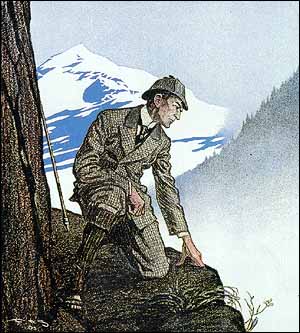Introducing the Modern Sherlock Holmes


A Study In Scarlet
Sherlock
Links to Articles Referenced In This Hub
- Newsarama.com : BBC's new SHERLOCK Annotations: Episode 1, A Study in Pink
By Alan Kistler - On Sherlock's "A Study in Pink"
By Allyn Gibson
The BBC miniseries places Sherlock Holmes in modern times, but remains true to the spirit of the original Holmes.
Sherlock Holmes first began delighting readers with his sharp mind and his adventures of intrigue in the late nineteenth century and he has continued to do so well into this day and age.Television and film portrayals over the years have brought Holmes and the nineteenth century alive for viewers, but the BBC has done something exceedingly rare: they’ve successfully placed Sherlock Holmes in modern London.Sherlock Holmes adapts extraordinarily well into modern times, as can be seen when comparing the very first episode, “A Study in Pink,” with Sir Arthur Conan Doyle’s 1887 novel, A Study in Scarlet.
Perhaps one of the most noticeable modern aspects of Sherlock is the technology; Sherlock Holmes has a cell phone! And according to Alan Kistler in an annotations article on the episode, this makes perfect sense: “In the original stories, Holmes was very much a modern man who constantly sent out telegrams to contact people for basic information so he wouldn’t have to waste time physically visiting and speaking with them...He was also constantly searching through his own files, guide books, collected newspaper clippings, and saved tabloids when he needed to research information. Hence, it makes sense that he would constantly check his phone to send texts and do internet searches.”For many people today, life without cell phones is unimaginable and to many Sherlock Holmes fans, the nineteenth century detective owning a cell phone might have seemed unimaginable.But the show’s creators, Mark Gatiss and Steven Moffat, show that it’s not necessarily a social tool; it’s an invaluable aid to the detective in getting information quickly to solve crimes.
Along the lines of modern technology, the modern-day Sherlock Holmes also has access to modern-day transportation.Instead of hansom cabs, there are taxi vehicles, and there are absolutely no horses to be seen anywhere.This suits the modern day adventures of Sherlock well; in our age, we are accustomed to action and it would be slightly more difficult to get an adrenaline rush from a chase scene involving a horse and carriage.There is a scene where Sherlock and John Watson run through the streets of London after a taxi that they suspect is holding the murderer they are searching for.It’s an exciting, high-intensity chase and it would be hard to imagine the same effect being achieved if they were chasing a horse and buggy.Additionally, Sherlock and John also use taxis to get them to the many places they need to be quickly and efficiently.
A modern service is referred to when we see Dr. Watson in therapy.From the original story, readers know that Watson has recently returned from the war in a physically weakened state, after being hit in the shoulder with a bullet and falling very ill from enteric fever.In the episode, John has a bullet wound but also appears to be effected mentally from the war; he dreams about it and he sees a therapist, who encourages him to write in a blog (this is definitely a modernized aspect of the original stories, having Watson use the internet instead of a written account to reach readers).Mycroft Holmes even spots Watson’s psychological link to the war when he says, “You’re not haunted by the war, Dr. Watson.You miss it.”And although John does appear to have a leg injury, Sherlock is able to prove that even that is psychosomatic.
The relationship between Sherlock Holmes and John Watson seems to have been modernized a bit.It is known that in the original, they start as flat mates, turn into colleagues, and eventually friends.The relationship between Sherlock Holmes and John Watson in the television series seems slightly amplified; we see them get close quite fast, probably because relationships do need to be developed quickly in a miniseries, but also maybe because in our modern age, viewers are more accustomed to seeing close male relationships and “bromances.”They are even on a first name basis in the episode, while in the original novel, Sherlock Holmes calls the doctor “Watson,” while Watson calls Sherlock, “Holmes.”Also, gay overtones are jokingly introduced, such as when Mrs. Hudson asks if they will need more than one bedroom at 221B Baker Street and when the restaurant owner refers to John as Sherlock’s date.These moments are funny and add to the modern aspect; people today are much more accepting of homosexuality than they were in the nineteenth century.
In the episode, the police force does not have as much respect for Sherlock Holmes as the police force in the book does.Although the detectives in A Study in Scarlet don’t seem to particularly like Holmes enormously, they recognize that they still need him at times.The police force in “A Study in Pink” think Sherlock is a psychopath; D.I Lestrade seems to be the only person to be even remotely friendly to him.Sergeant Sally Donovan often calls him a freak and warns John to stay away:“You know why he's here? He's not paid or anything. He likes it. He gets off on it. The weirder the crime the more he gets off. And you know what? One day just showing up won't be enough. One day we'll be standing around a body and Sherlock Holmes will be the one who put it there.” Perhaps it would be rare in this modern age for someone like Sherlock Holmes to exist and be respected; in a world that has seen so many awful crimes and weird people and where people are distrustful and suspicious, his tactics and interest in murders can be viewed as strange and even somewhat disturbing. But perhaps in the nineteenth century, a man like Holmes was accepted; he was merely very intelligent and there was no threat perceived.
The plot of the book was given a bit of a modern twist, as well; the “Rache” situation in the episode is the total opposite from the book.In the book, “Rache” is written on the wall with blood and Lestrade says, “Why, it means that the writer was going to put the female name Rachel, but was disturbed before he or she had time to finish.You mark my words, when this case comes to be cleared up, you will find that a woman named Rachel has something to do with it (39).” Holmes laughs at this and reveals that “Rache” is the German word for revenge.In the episode, Anderson suggests the same theory about the scratched word in the floor is the German name for revenge, while Sherlock waves this away as ridiculous and insists it is a woman’s name.And he is right; Rachel was the fourth victim’s stillborn daughter and “Rachel” is the password to her email – another modern twist.
Furthermore, there is a more modern take on the murder’s motive. In the book, Jefferson Hope is out for revenge because Mormons killed his love’s father and more indirectly, his love.In the episode, the cabbie has a brain aneurysm and will soon die; he kills because he has a sponsor and for every person he kills, his kids will get more money. A murderer needing to support his children is a much more modern take than dangerous Mormons.
In an article on his website, Allyn Gibson says of Holmes and Watson, "They, more perhaps than even Queen Victoria, define the way we, today, look back on the Victorian era. Gaslamps. Fog. Cobbled streets and hansom cabs.”And while this is true, the modern Sherlock still manages to maintain an old-fashioned and timeless feeling. “A Study in Pink” takes various aspects from A Study in Scarlet and either modernizes them or adapts them in entirely different ways, while adding a few fun things alone the way; BBC’s Sherlock Holmes has a website instead of an article, enjoys Chinese food, and can even predict the fortune cookies.The modernization of the characters and story does not take away from the classic Sherlock Holmes legacy.BBC has brought Sherlock and Watson into the new millennium and has made them come alive for new generations of fans.







